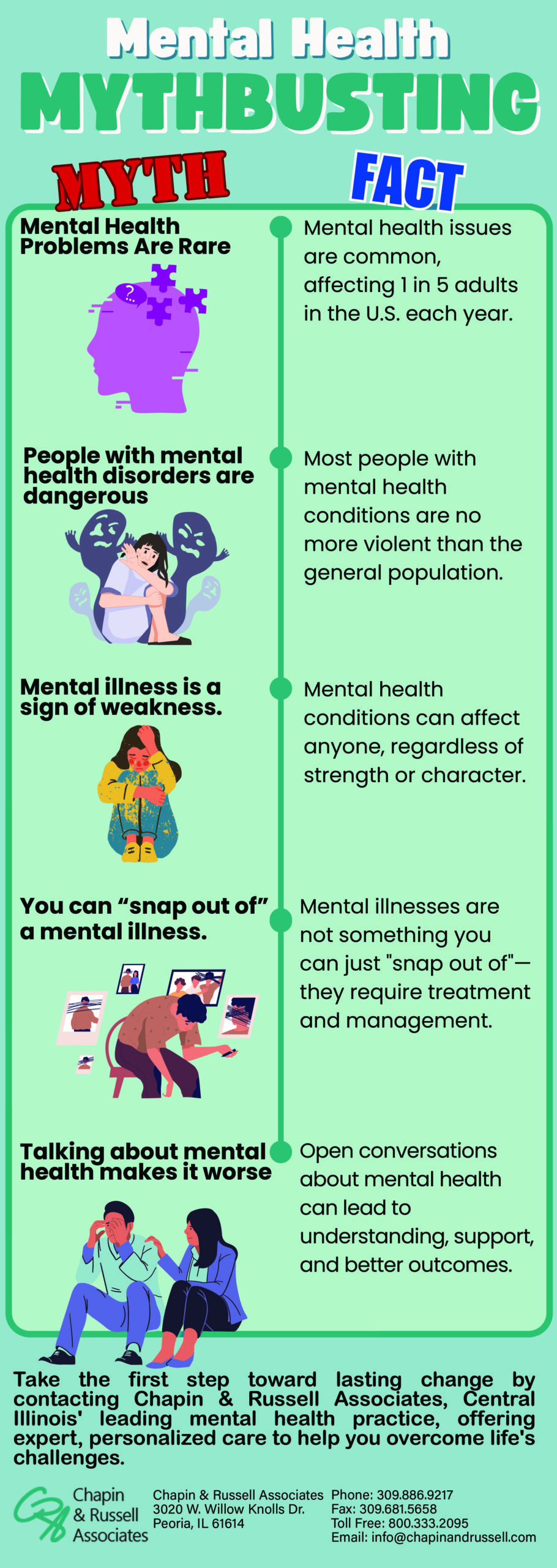
Myths, disinformation, and a lack of understanding can often push forward a narrative that’s false and dangerous for those who believe it. Yet, with the sheer volume of incorrect statements that get thrown around the internet and social circles every day, it becomes difficult to combat, especially when it concerns mental health. Too many individuals go without treatment for their mental health symptoms, afraid or unaware of the effectiveness of psychotherapy. At Chapin & Russell Associates, we look to dispel the myths surrounding mental health and seeking proper treatment. If you are unsure about what mental health might look like, and the facts about treating or contending with emotional dysregulation, let Chapin & Russell Associates “bust” some of the more pervasive myths.
Myth: Mental health problems are rare.
Why do people think this way? It’s simple enough to dismiss personal mental health struggles as nothing more than “a bad day,” not wanting to accept there might be something more profound to your dysregulation. Additionally, fear and stigma around mental health have led people to talk less about it, leaving individuals in the dark as to the signs and symptoms of depression, anxiety, stress, etc.
What’s the truth? Mental health problems and illnesses are more common than the myth would have you believe. Even if you don’t believe yourself to be contending with such issues, it’s likely someone you know or are familiar with is. To further prove a point, there are numbers to back the idea of mental illness as a common occurrence:
Per the Center for Disease Control (CDC), the National Institute for Mental Health (NIMH), and the Substance Abuse and Mental Health Services Administration (SAMHSA), as of 2020:
- Mental health issues affect 1 in 5 adults in the U.S. each year.
- More than 1 in 5 younger individuals, ages 13-18, are or have dealt with a mental illness at some point in their life.
- Almost 1 in 25 adults in the U.S. live with a serious mental illness.
Myth: People with mental disorders are dangerous.
Why do people think this way? Unfortunately, media and television are to blame for our perception of violence and mental health. It’s not too uncommon for your favorite crime show to blame the violent and aggressive actions of a criminal on their mental state. Even real-world events covered by the news place much of the fear and blame on the individual and their mental illness. However, not all individuals with mental health illnesses are violent.
What’s the truth? People with mental health conditions are no more violent than people without them. Only about 3-5% of all violence in society is perpetrated by those with mental health disorders. In fact, there’s more evidence to the contrary, showing those with mental health disorders are more likely to be victims of violent acts rather than those causing them. Furthermore, factors like substance abuse, trauma exposure and structural disparities are shown to influence violence more.
Myth: Mental illness is a sign of weakness.
Why do people think this way? A lack of knowledge of the way mental health works can lead to misunderstandings, such as the assumption mental illness is a sign of weakness. It’s easy for someone to not look at all the facts of an individual’s illness and simply declare the person has no one to blame for their problems but themselves.
What’s the truth? Mental health conditions can affect anyone, regardless of strength, character or willpower. Instead, mental illness is the result of environmental factors, trauma, or a person’s genetics. Much of the causes of emotional dysregulation are outside our immediate control and have little to do with personal decisions or direct actions. Worse yet, the stigma of mental health problems can fuel a never-ending cycle of negative thoughts and lower self-esteem, further feeding the perception of mental illness as a weakness.
Myth: You can “snap out of” a mental illness.
Why do people think this way? You’ve likely heard it said before: “Why can’t you just get over it?” Or, “Why can’t you get a grip?” “Why can’t you snap out of it?” A lack of understanding of mental health leads people to believe emotional dysregulation is nothing more than a fleeting feeling or mood that will go away with time. By all accounts, a supposedly depressed individual might also seem happy or cheerful at other points you see them. However, this doesn’t mean nothing is wrong.
What’s the truth? A mental illness is like any other illness. If someone broke their arm, would you tell them to “Stop worrying about it?” Or, if you had something as serious as cancer, are there people who tell you, “It’s all in your head?” We hope not! However, expecting someone to “snap out of” mental illness makes as much sense as expecting someone to recover from a physical ailment by choice. Someone with a mental illness requires treatment and management, the same as any physical illness.
Myth: Talking about mental health makes it worse.
Why do people think this way? Just talking about the symptoms of depression and anxiety can be enough to trigger them. At least, that’s what some people might have you believe. There is a perception that talking about your emotional health and feelings can make issues worse. As a result, those contending with mental illness might not seek treatment or discuss it with a professional.
What’s the truth? Having open conversations about your mental health is only beneficial. Venting your frustrations to a trusted friend or family member can lead to understanding, support, and better overall outcomes. Better yet, discussing your mental health concerns with a trained professional, such as the counselors at Chapin & Russell Associates, can help you get to the root of your emotional dysregulation and discover ways to better manage and dispel negative thoughts and symptoms.
Get in Touch with Chapin & Russell Associates
Addressing your mental health and potential mental illness starts with counseling and therapy performed by experienced mental health professionals. If you live in the Greater Peoria Area, Chapin & Russell Associates can be your guide to less stress, less anxiety, and more positive thinking. To dispel mental health myths and improve your emotional well-being, contact Chapin & Russell Associates today at 309-681-5850 to schedule an appointment with our counselors.


